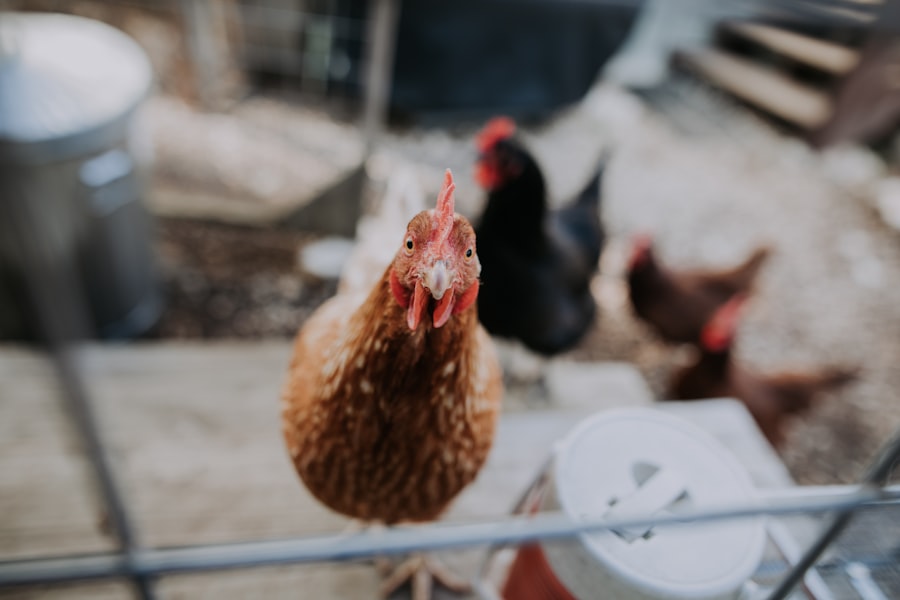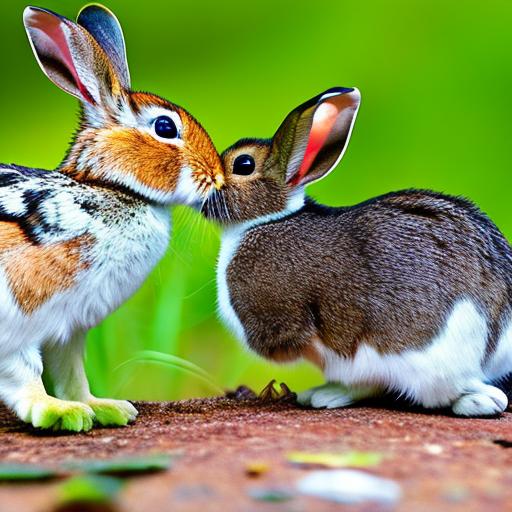Keeping bunnies and chickens together can be a rewarding experience for many reasons. On one hand, bunnies and chickens can provide companionship for each other and help to keep each other entertained. They can also help to control pests in the garden and provide a source of fresh eggs and fertilizer. However, there are also drawbacks to consider. Bunnies and chickens have different dietary needs and housing requirements, and they may not always get along. It’s important to carefully consider these factors before making the decision to keep bunnies and chickens together.
Key Takeaways
- Keeping bunnies with chickens can have both pros and cons.
- Compatibility between bunnies and chickens depends on their individual personalities and behavior.
- Factors such as space, predator protection, and social dynamics should be considered before keeping bunnies with chickens.
- Separate housing and feeding areas are necessary for bunnies and chickens to coexist peacefully.
- Regular health checks and hygiene practices are important to prevent disease transmission between bunnies and chickens.
Understanding the Compatibility of Bunnies and Chickens
Bunnies and chickens can coexist peacefully if certain conditions are met. Both animals are social creatures and can benefit from having companions of their own species. Bunnies are generally non-aggressive animals, while chickens have a natural pecking order within their flock. This means that bunnies are less likely to be aggressive towards chickens, but chickens may peck at bunnies if they feel threatened or if they are competing for resources.
It’s important to understand the natural behaviors of both animals in order to create a harmonious environment for them. Bunnies are burrowers and like to dig, so providing them with a suitable area for digging can help to satisfy this instinct. Chickens, on the other hand, like to scratch the ground and dust bathe, so providing them with a suitable area for these activities is important. By understanding these behaviors, you can create an environment that meets the needs of both animals.
Factors to Consider Before Keeping Bunnies with Chickens
Before deciding to keep bunnies with chickens, there are several factors that need to be considered. First, you need to consider the size and breed of both animals. Some breeds of chickens are more aggressive than others, so it’s important to choose breeds that are known to be docile and friendly. Similarly, some breeds of bunnies are more territorial than others, so it’s important to choose breeds that are known to be sociable and tolerant of other animals.
Another important factor to consider is the amount of space and resources that you have available. Bunnies and chickens both need adequate space to roam and exercise, as well as access to fresh food and water. If you don’t have enough space or resources for both animals, it may be best to keep them separate.
Finally, it’s important to consider the potential risks and dangers of keeping bunnies and chickens together. Bunnies are susceptible to certain diseases that can be transmitted by chickens, such as coccidiosis. Chickens can also be carriers of parasites that can affect bunnies. Additionally, chickens may peck at bunnies if they feel threatened or if they are competing for resources. It’s important to carefully consider these risks before making the decision to keep bunnies and chickens together.
Housing Requirements for Bunnies and Chickens
When keeping bunnies and chickens together, it’s important to provide separate areas for each animal. Bunnies should have a hutch or cage that is large enough for them to move around comfortably, with plenty of bedding material for burrowing. Chickens should have a coop that is secure from predators and provides adequate ventilation, lighting, and temperature control.
It’s also important to provide separate areas for feeding and watering. Bunnies and chickens have different dietary needs, so it’s important to ensure that each animal has access to the appropriate food and water. This will help to prevent competition and potential aggression between the animals.
In addition to separate areas, it’s also important to provide areas where the animals can interact with each other if they choose to do so. This can be a fenced-in area where the animals can safely interact under supervision. By providing separate areas and supervised interaction, you can help to create a safe and comfortable environment for both animals.
Feeding and Nutrition Needs of Bunnies and Chickens
Bunnies and chickens have different dietary needs, so it’s important to provide a balanced diet for each animal. Bunnies are herbivores and require a diet that is high in fiber, such as hay, fresh vegetables, and pellets. Chickens, on the other hand, are omnivores and require a diet that is high in protein, such as grains, seeds, insects, and kitchen scraps.
It’s important to provide each animal with the appropriate food for their species. Feeding bunnies a diet that is high in protein can lead to health problems such as obesity and kidney disease. Feeding chickens a diet that is high in fiber can lead to digestive problems and poor egg production.
It’s also important to avoid feeding bunnies and chickens foods that are toxic to them. Some common foods that are toxic to bunnies include chocolate, caffeine, onions, and garlic. Some common foods that are toxic to chickens include avocado, chocolate, caffeine, and raw beans. By providing a balanced diet and avoiding toxic foods, you can help to ensure the health and well-being of both animals.
Health and Hygiene Concerns When Keeping Bunnies with Chickens

When keeping bunnies with chickens, it’s important to maintain good hygiene practices to prevent the spread of disease. Bunnies are susceptible to certain diseases that can be transmitted by chickens, such as coccidiosis. Chickens can also be carriers of parasites that can affect bunnies.
To prevent the spread of disease, it’s important to regularly clean and disinfect the housing areas for both animals. This includes removing soiled bedding, cleaning food and water dishes, and disinfecting surfaces. It’s also important to practice good hand hygiene, such as washing your hands before and after handling each animal.
Regular veterinary check-ups are also important to ensure the health and well-being of both animals. A veterinarian can provide vaccinations and preventative treatments for both bunnies and chickens, as well as diagnose and treat any health problems that may arise.
Managing Social Interactions Between Bunnies and Chickens
When keeping bunnies with chickens, it’s important to monitor their interactions to ensure that they are getting along. While bunnies are generally non-aggressive animals, chickens may peck at bunnies if they feel threatened or if they are competing for resources.
To promote positive social interactions between the animals, it’s important to provide plenty of space and resources for both animals. This includes providing separate areas for feeding and watering, as well as areas where the animals can interact with each other if they choose to do so.
If you notice any signs of aggression or bullying between the animals, it’s important to intervene and separate them if necessary. This may involve providing additional resources or adjusting the housing arrangements to reduce competition and potential aggression.
Potential Risks and Dangers of Keeping Bunnies with Chickens
There are several potential risks and dangers to consider when keeping bunnies with chickens. One of the main risks is disease transmission. Bunnies are susceptible to certain diseases that can be transmitted by chickens, such as coccidiosis. Chickens can also be carriers of parasites that can affect bunnies.
Another potential risk is predators and other external threats. Bunnies are prey animals and can be vulnerable to predators such as dogs, cats, and birds of prey. Chickens are also vulnerable to predators such as foxes, raccoons, and snakes. It’s important to take measures to protect both animals from these threats, such as providing secure housing and fencing.
To mitigate these risks, it’s important to practice good hygiene and provide regular veterinary care for both animals. It’s also important to provide secure housing and fencing to protect both animals from predators and other external threats.
Tips for Successfully Keeping Bunnies with Chickens
To successfully keep bunnies with chickens, it’s important to plan and prepare properly. This includes choosing breeds that are known to be compatible, providing adequate space and resources for both animals, and practicing good hygiene and veterinary care.
Ongoing monitoring and maintenance are also important to ensure the health and well-being of both animals. This includes regularly cleaning and disinfecting the housing areas, providing a balanced diet for each animal, and monitoring their interactions for signs of aggression or bullying.
By following these tips, you can promote a safe and healthy environment for both bunnies and chickens.
Is Keeping Bunnies with Chickens Right for You?
Keeping bunnies with chickens can be a rewarding experience, but it’s important to carefully consider the decision before proceeding. There are many factors to consider, including the size and breed of both animals, the amount of space and resources available, and the potential risks and dangers.
By understanding the compatibility of bunnies and chickens, considering the housing requirements, feeding and nutrition needs, health and hygiene concerns, managing social interactions, and mitigating potential risks, you can create a safe and healthy environment for both animals.
If you’re considering keeping bunnies with chickens, it’s important to do your research and seek advice from experts in order to make an informed decision. There are many resources available online and through local agricultural organizations that can provide further information and support.
In conclusion, keeping bunnies with chickens can be a rewarding experience if done properly. By carefully considering the factors discussed in this article and taking the necessary precautions, you can create a harmonious environment for both animals and enjoy the benefits that they bring.
If you’re considering keeping bunnies with chickens, it’s important to understand the dynamics between these two animals. While they can coexist peacefully, there are certain factors to consider. One important aspect is providing adequate housing for both species. In a helpful article by Poultry Wizard, they discuss the importance of a well-designed chicken coop in Grand Island, NE, which can also accommodate bunnies. This informative piece provides valuable insights and tips on creating a safe and comfortable environment for your feathered and furry friends. Check out the article here for more details on how to successfully keep bunnies with chickens.
FAQs
What is the article about?
The article is about whether it is possible to keep bunnies with chickens.
Can bunnies and chickens live together?
Yes, bunnies and chickens can live together peacefully if they are introduced properly and have enough space.
What are the benefits of keeping bunnies and chickens together?
Keeping bunnies and chickens together can provide mutual benefits such as companionship, pest control, and manure management.
What are the risks of keeping bunnies and chickens together?
The risks of keeping bunnies and chickens together include potential aggression between the animals, the spread of diseases, and the possibility of the bunnies being trampled by the chickens.
How should bunnies and chickens be introduced?
Bunnies and chickens should be introduced gradually and in a neutral space. It is important to supervise their interactions and separate them if any aggression occurs.
What kind of housing is suitable for bunnies and chickens?
Bunnies and chickens should have separate housing that is appropriate for their specific needs. The housing should be secure and provide enough space for the animals to move around comfortably.
What kind of diet do bunnies and chickens need?
Bunnies and chickens have different dietary needs. Bunnies require a diet high in fiber, while chickens require a diet high in protein. It is important to provide each animal with the appropriate food and not to feed them each other’s food.
Meet Walter, the feathered-friend fanatic of Florida! Nestled in the sunshine state, Walter struts through life with his feathered companions, clucking his way to happiness. With a coop that’s fancier than a five-star hotel, he’s the Don Juan of the chicken world. When he’s not teaching his hens to do the cha-cha, you’ll find him in a heated debate with his prized rooster, Sir Clucks-a-Lot. Walter’s poultry passion is no yolk; he’s the sunny-side-up guy you never knew you needed in your flock of friends!







